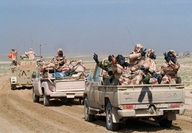Operation Enduring Sunrise
| Operation Enduring Sunrise | |||||||
|---|---|---|---|---|---|---|---|
| Part of the Stratean Front of the Third Great War | |||||||
| |||||||
| Belligerents | |||||||
|
Third Coalition File:Delgada Niagara.png Delgada Supported By |
Laurillac Pact Supported By | ||||||
| Commanders and leaders | |||||||
|
|
| ||||||
| Units involved | |||||||
|
|
| ||||||
| Strength | |||||||
|
Peak strength in 1979 |
Peak strength in 1979 | ||||||
| Casualties and losses | |||||||
|
Military Dead: TBD Civilians Dead: TBD Total Dead: TBD |
Military Dead: TBD Civilians Dead: TBD Total Dead: TBD | ||||||
|
Total Dead: TBD | |||||||
Operation Enduring Sunrise was a Gagian and Narulian military operation that involved the invasion of the nations of Mantocia and Senarwa during the Third Great War. In 1976, Gagium declared war on the Third Coalition, led by Greater Niagara, The Furbish Islands, and Alaoyi, as a result of Inglaterra's invasion of the Niagaran Canal Colony. Acting against increased Third Coalition deployments of soldiers to the León Monarchy, Gagium launched a number of military attacks on Coalition bases on Stratea.
As early as July 1976, Gagian Prime Minister Ulysse Cohen had begun planning an invasion on the nations of Mantocia, Lurona and Senarwa due to their cooperation in providing oil to the Third Coalition. In October 1976, Narulian President TBD met with Cohen to discuss military deployment in the Gulf of Atily, as TBD believed that an outbreak of war on Stratea would result in Senarwa invading the country. During the meeting, both leaders planned an invasion of the three countries that would begin in January 1977. However, correspondence between the Gagian ambassador to Lurona and the Luronan government in December 1976 was able to greatly reduce Luronan oil shipments to Third Coalition powers, thus changing the plans for invasion.
On March 31, 1977 Operation Enduring Sunrise commenced as Gagian forces conducted a naval invasion of Mantocia, and Gagian and Narulian forces began an invasion of Senarwa. Preluding the invasion, Gagian naval forces were briefly confronted by the Furbish Navy in the TBDENCOUNTER. Within the first month of Operation Enduring Sunrise, Laurillac Pact forces were able to successfully seize the Mantocian cities of Rosella and Avendita, as well as the Senar city of Agurik. Meanwhile, Vadurzil, with Narulian support, began a military campaign against Aghankir. However, the Third Coalition was quick to respond to Enduring Sunrise. Following the TBDNAVALBATTLE, the Gagian Navy was forced to temporarily cede control over the to the Coalition, allowing for Greater Niagara and the Furbish Islands to launch airstrikes against Gagian and Narulian positions throughout 1978. In spring of 1978, the Laurillac Pact began the Magalaki Offensive, an attempt to sieze the Senarwan capital of Magalaki. Early successes included the capture of Magalaki International Airport, but the offensive ultimately failed and Pact forces were forced to retreat by May 1979.
The October Revolution of 1980 would prelude the Invasion of Gagium, prompting Ulyssee Cohen to demand the withdrawal of soldiers from the Gulf of Atily in order to reinforce defense forces at home. However, this was not possible due to Coalition control of the Tenific Ocean. As such, Gagian forces in Senarwa moved to a supporting position of Narulian forces for the final years of the operation. Operation Forgiving Blade resulted in heavy losses for both Gagian and Narulian forces, and with a still-increasing deployment of Coalition soldiers and equipment to the region, both nations were forced to reevaluate their strategies. Large amounts of Gagian forces began to dissent after the Tagikuli Massacre, and the problem only worsened after Gagium's failed bid to capture Paluri ended in January 1982. After months of guerilla warfare waged by remnant Gagian forces with Narulian support (including operations such as Renewed Insurgence), the Zuhalurra Armistice formally ended hostilities on 7 July 1982.



